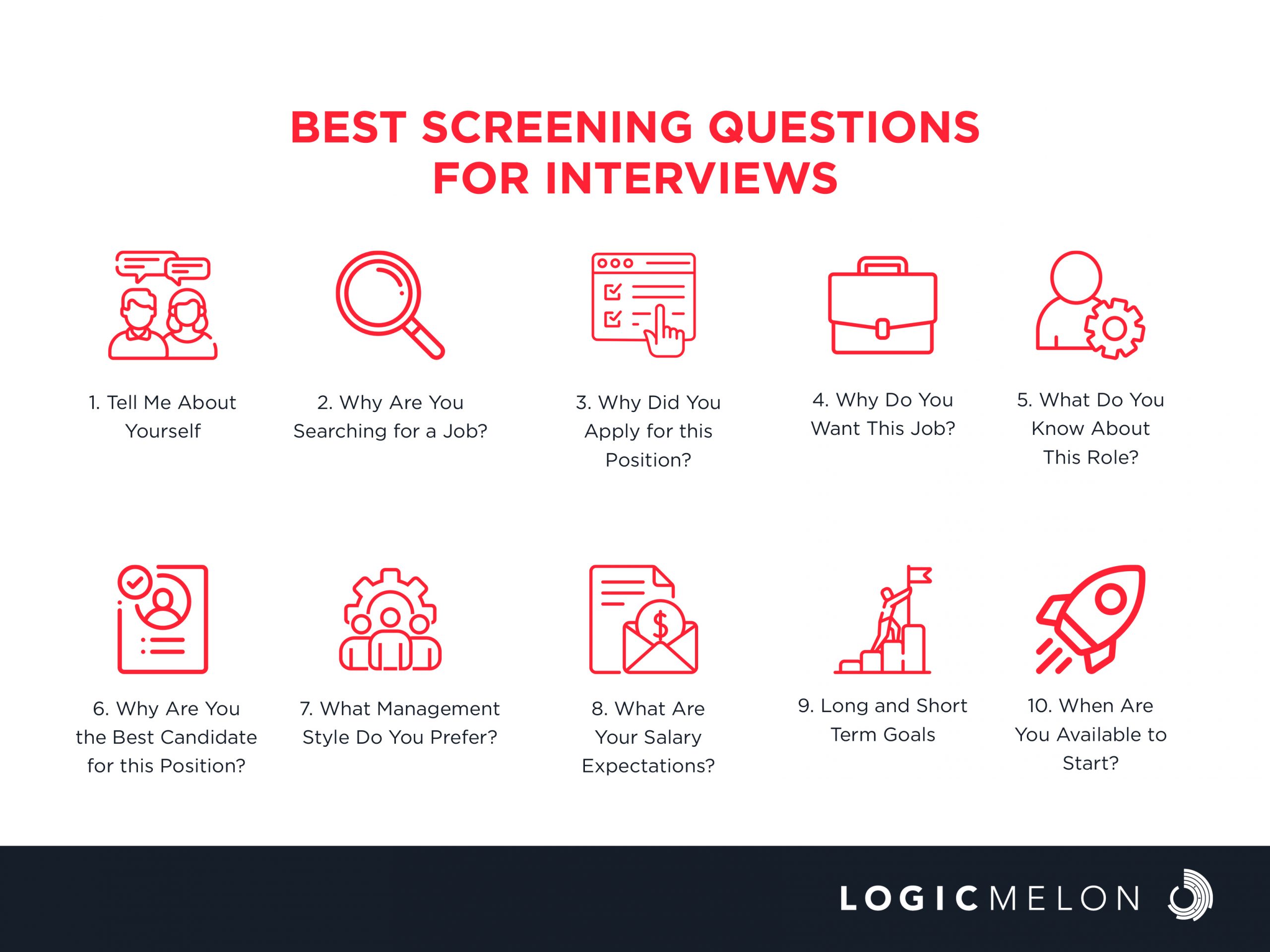10 Best Screening Questions for Interviews
Screening questions are used during an interview to help identify if a candidate has the necessary skills and qualifications for the role they are applying for.
Screening questions help to eliminate the candidates who are not qualified for the role can help to focus on individuals who have the potential to be a good fit for your company.
The screening process takes anywhere between 15 to 30 minutes. Hiring managers use these questions to determine how your personality and goals fit the employer’s work environment.
Pre-screening is a series of questions that help you learn some basic qualification information about candidates prior to conducting a more extensive interview.
Top 10 Screening Questions for Interviews

1. Tell Me About Yourself
Interviewers typically start to screen candidates by asking questions about their backgrounds. Use this question to explain your work experience, current work, and why you’re a qualified candidate. While you may mention personal details, focus on professional qualifications and achievements when summarising your background.
2. Why Are You Searching for a Job?
Employers ask this question to find out what your motivation is behind searching for a job. If you currently have a job, give a reason that focuses on your career. Interviewers are looking for a few key pieces of information, including how much thought you have put into the job search.
3. Why Did You Apply for this Position?
This helps employers to identify candidates who have a genuine interest in the position. Interviewing for a position helps to find out the candidate’s interests in specialising in a field, and for managers to get the best out of them in the organisation.
4. Why Do You Want This Job?
This question gives the employer insight into the needs of the candidate and helps to understand the current work situation. The reason for joining the job describes the candidate’s career plans and the purpose for which the candidate wishes to accomplish in the organisation.
5. What Do You Know About This Role?
This question evaluates whether you researched the company or not. It also offers an opportunity to describe what motivates you to perform in this role. As the candidate, you must properly communicate your motivations for pursuing the role, and understand which of the qualifications are most relevant.
6. Why Are You the Best Candidate for this Position?
This offers the candidates the opportunity to describe why they are ideal candidates for the job. The interviewer does not want you to compare yourself with other candidates, but the interviewer is assessing how well you understand the job and how confident you are in your abilities.
7. What Management Style Do You Prefer?
The employer gets a clear idea of what the employee expects from the organisation to get the best out of the candidates. Employers ask about your management style preferences to determine whether your leadership matches the current company. This allows them to place new employees under supervisors or managers who can communicate well together and promote productive operations.
8. What Are Your Salary Expectations?
This question helps the interviewer determine whether the salary expectation aligns with their budget. When answering, it’s best you provide a range to show that you’re flexible. Hiring managers to evaluate whether you are on par with what they are willing to offer, or what the industry average is.
While companies typically want to stay within their set budget, some organisations will adjust their budget if the candidate offers an exceptionally similar salary that is higher than what the company originally budgeted for.
9. Long and Short Term Goals
The goals help the employer to understand the objective the employee wants to achieve in the organisation. Long-term goals are to complete it in the distant future which takes time, planning, and patience. The hiring manager wants to know whether you will stay at the company for some time because hiring and training a new employee is expensive. So, the interviewer wants to make sure you will stay for a while.
10. When Are You Available to Start?
The employer asks this type of question when they consider that you’re a serious candidate for the role that they’re offering. They want to know how much time it will take to fill the available position in the company.
Frequently Asked Questions (FAQs)
1. How do screening questions help to assess potential candidates?
Screening questions are necessary because they help in saving time by eliminating the candidates who are not qualified for the role.
2. What is the screening process for recruitment?
Candidate screening is the process of reviewing job applications to determine, which candidate should be taken forward into the later parts of the recruitment process. The recruiters must review each applicant’s education, work experience, and skills to assess whether they would be a good fit for the role.
3. What does screening mean for a job?
A screening interview is a part of the job selection process used by employers to determine if a candidate has the qualifications necessary to do the job for which the company is hiring. It is typically the first interview during the hiring process.
4. What questions are asked in a screening call?
Tell me about yourself, Why are you searching for a job? , Why did you apply for this position? Why do want this job? , What do you know about this role, Why are you the best candidate for the role? , What type of management style do you prefer? , What are your salary expectations? , Long and Short term goals, and When are you available to start?
Closing Thoughts
Screening interview questions is simply a process for elimination. The objective of using various screening is to filter out candidates that either does not meet the standards set by the organisation, or are not a good fit for the culture for other reasons.
The pre-screening interview is pre-employment screening questions that are conducted prior to conducting a more extensive interview process.
The questions help to eliminate the candidates who are not qualified for the role and can help to focus on individuals who have the potential to be a good fit for your company.
LogicMelon
Award-winning recruitment software that will find, attract, hire and analyse the way you want to work. At LogicMelon, we have experienced software recruitment marketing specialists to help you build effective recruitment solutions supported by the best customer service you’ll find anywhere!
Email: sales@logicmelon.com or call LogicMelon (UK) +44 (0) 203 553 3667 (USA) +1 860 269 3089
Tips to Manage Underperformance in Employees
As an employer, you need to understand that this is common, and every workplace faces some form of underperformance issue, regardless of the nature of its business. Your responsibility is to identify the reasons for the underperformance and manage them.
Reasons for Employee Underperformance
To manage the employees who underperform in your company, you need to understand the causes of the underperformance in employees and address them quickly.
Flexible Working Policy: Advantages and Disadvantages
A flexible working policy is when employers give employees flexibility in how long they work, where, and when they need to work.


